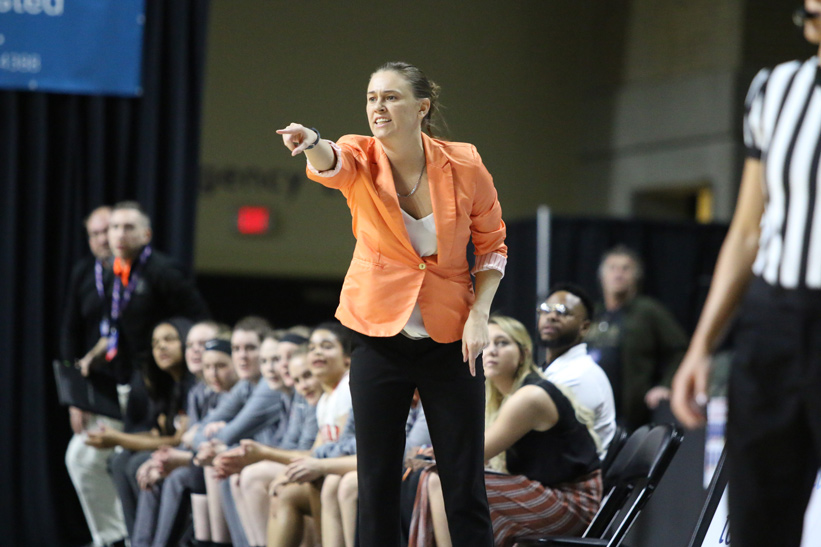When Jessie Biggs took over as the head coach of the Indiana Tech women’s basketball team prior to the 2012-13 season, the Warriors had only two winning seasons in the previous eight years and hadn’t made it to the NAIA national tournament since the 1994-95 season. That year marked the Warriors’ fourth straight trip to the national tournament under Hall of Fame head coach Gary Cobb.
The first-year head coach knew she would have a long road ahead of her to get the team back on the winning track. So, she started off with what she knew best: putting her head down and getting to work. Soon thereafter, the culture of the program began to change.
“I’m blessed with a creative mind,” Biggs said, “And, I had a vision with two great assistant coaches that I had at the time. Our rewards in that vision weren’t until year four and we knew that we weren’t going to reap the benefits until year four. There were some sleepless nights and some thoughts of ‘Am I doing this the right way?’ and ‘Am I cut out for this?’ But, in the end, you have to stick to your game plan, morals and core values, and believe in yourself.”
Biggs’ first three years were an up-and-down journey—the 2013-14 squad went 19-13 (the most wins the program had recorded since 2002), but that season was sandwiched between 13-18 and 12-19 campaigns. However, things began to turn around in the fall of 2015 when a pair of freshmen, Kendall Knapke and Bella Lozano-Dobbs, and a sophomore transfer, Haley Cook, changed the fortunes of the team. That next season, Tech went 21-11, cracking the 20-win plateau for the first time since 1993-94 and finishing in a tie for third in the Wolverine-Hoosier Athletic Conference (WHAC). The team finished the year receiving votes in the NAIA Coaches’ Top 25 Poll while Cook garnered WHAC Newcomer of the Year honors and was named to the NAIA all-America team.
“Year four we started seeing some success and then it really started taking off,” Biggs noted.
From that point on, the product of Ottumwa, Iowa, knew she had something special brewing in the Summit City, and the stakes were raised even higher in the summer of 2016 when Biggs landed transfer Keanna Gary, a product of nearby Leo High School, who was coming in after two years at NCAA Division I neighbor IPFW (now known as Purdue Fort Wayne). Gary was a force in the paint during her first season. She recorded a program-record and NAIA-leading 22 double-doubles and earned WHAC Player of the Year, WHAC Newcomer of the Year and first-team all-American honors. Teaming up with Cook, Knapke, Lozano-Dobbs and Taylor Seiss, the Orange and Black went 25-8 to finish second in the WHAC and rose to No. 16 in the NAIA Coaches’ Top 25 Poll. The team received an at-large bid to the NAIA Division II National Championship, the first time in 22 years Tech had made the tournament, while Biggs was named the WHAC Coach of the Year and the Women’s Basketball Coaches’ Association (WBCA) Regional Coach of the Year. The team finished eighth in the WBCA Top 25 Academic Honor Roll as well.
Tech continued to climb up the staircase of success in the 2017-18 season with a historic one, winning the WHAC regular-season title for the first time in program history and earning the team’s first conference championship since 1995. The team went on an 18-game winning streak and Biggs was named the WHAC Coach of the Year for the second straight season. Gary recorded 22 more double-doubles en route to all-America honors, while Cook was named an NAIA first-team all-American, the WHAC Player of the Year and a CoSIDA Academic All-American. The Warriors won their first round game in the NAIA National Championship, the first time since the mid-90s the program had won a game in the national tournament. The team finished the season with a 3.675 GPA and finished second in the WBCA Academic Top 25 Honor Roll.

The Warriors were becoming a household name among the NAIA ranks and jumping to the elite ranks of Tech teams, both on the court and in the classroom. Successful teams aren’t built overnight, but once you get to that point, the challenge turns from trying to climb the mountain, to staying on top of the mountain. Biggs knew she had to continue to instill that culture of hard work and respect into her players.
“Goals become expectations, expectations become standards and standards become everyday practices, and that allows you to keep building,” Biggs said. “Our goals of four years ago are standards today. It’s a slow-moving process. It’s not like we woke up one day and discovered that we were good. It’s a progression. Every year our expectation becomes a standard on how we’re going to do things.
“We keep it competitive,” she added when asked how she keeps her student-athletes motivated. “I’m very honest with them. I tell every returner that unless you win a national championship and go undefeated, your job is to get better and my job is to recruit better than you. We keep that competitive nature and there is a sense of respect towards our program now that they don’t want to let it down. I tell them multiple times a day, it’s time to put your hard hats on. We’re not exceptional basketball players, we just outwork everyone every day. We take the mentality into everything we do every day.”
This past year was another one for the record books as Biggs led the Warriors to a 32-4 record. The Warriors repeated as WHAC champions and won the WHAC Tournament for the first time ever. The team advanced to the quarterfinals of the NAIA Division II National Championship for the first time since 1992, where it fell to eventual national champion and the overall top seed Concordia University (Neb.). Biggs was named the WHAC Coach of the Year for the third straight season while the team rose as high as number three in the Coaches’ Top 25 Poll, thanks to a program-record 23-game winning streak. Knapke finished her career with NAIA all-America and CoSIDA Academic all-America Team Member of the Year honors, and became the program’s all-time leader in games played and starts with 136 (she started every game of her career). All five starters received all-conference accolades and the team finished with a 3.8 GPA.
Biggs knows the 2018-19 squad will look vastly different on Kline Court with the graduation of Knapke, Lozano-Dobbs and others, but she knows the culture they helped build and define will still be there, even outside the walls of the Schaefer Center.
“Your core values and morals are the same,” she said on the differences of recruiting young women to the program now versus eight years ago. “Our team commitments are respect, responsibility and time management; those are the three things we talk about every day. You don’t have to have the same opinion as someone else, but you have to respect each other and that’s how we approach things and stay on common ground.
“Respecting each other and their differences allows us to work together to achieve our goal on the court, winning games. That’s something that we’ve worked towards. To get through to someone, everyone is different. Some players you can get on, some need a pat on the back. Some have a bad practice and you need to sit down with them and listen to them talk about their life. Everyone is different. Getting to know my players off the floor and how they function allows me to reach them and relate to them as basketball players.”
While she knows that wins and losses on the court are what most people see at the end of the day, the 1,000-point scorer at the University of Northern Iowa understands that what happens off the court and after they leave Indiana Tech is of much greater importance.
“I talk to Randi Henderson (head coach at Washington University in St. Louis and former head coach at Coe College, where Biggs broke into the coaching ranks) a lot and she gives me life lessons that I try to pass on to my players,” Biggs said. “I try to contact others that are going to ask me, ‘Jessie, did you make them a better person today?’ As long as that’s happening, there’s going to be up and downs with basketball. Wins and loses are short-term, but how my players are as people in 10 years is what matters to me.”
